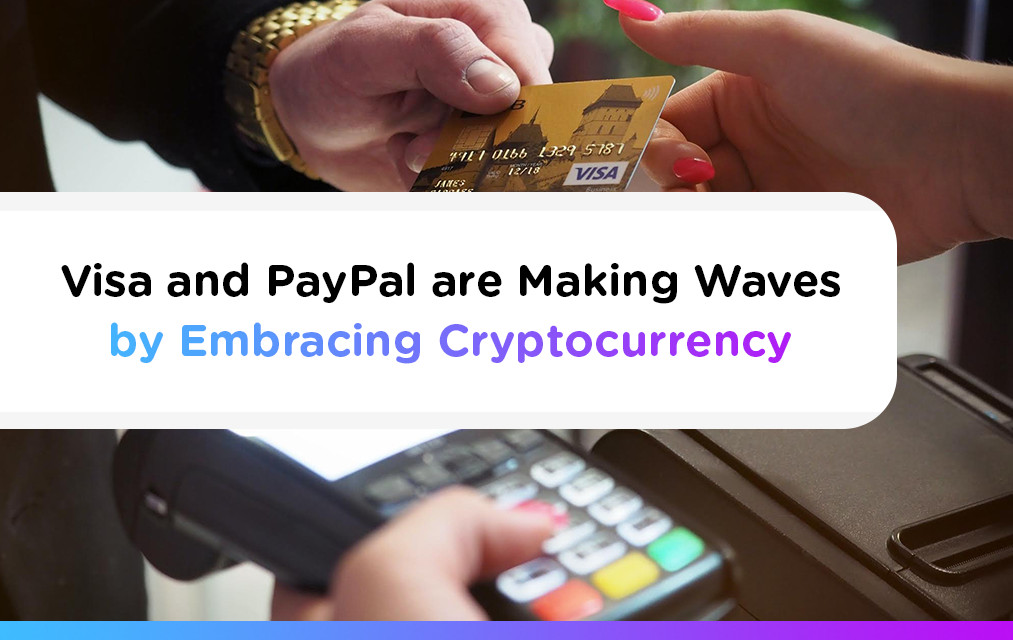Near the end of March 2021, Visa and PayPal made steps to better incorporate cryptocurrency into their services, making waves in the cryptocurrency community.
For the cryptocurrency community, this is a huge step forward. Visa and PayPal are giants in their industries. Their acceptance of cryptocurrency signals a change in the way people view the legitimacy of cryptocurrency, outside of its potential as an investment.
Both customers and businesses can now reap the benefits of actually using cryptocurrencies like Bitcoin for its original intended purpose: as an efficient way to transfer money over the internet in a secure, decentralized financial system.
This is how Visa and PayPal are changing the perception of cryptocurrency, and how both people and businesses benefit.
Simplifying the Process
Visa partnered with Crypto.com to create a crypto-linked Visa card. This will allow vendors to accept cryptocurrency payments without needing to convert their money to fiat.
Originally, businesses that accepted the card needed to convert their cryptocurrency into fiat money, which was deposited to a bank account and wired to Visa at the end of the day to pay off processing fees. This system allowed businesses to accept cryptocurrency, but it had its flaws. Namely, it added time, cost, and complexity for everyone involved.
By allowing payments to go through without converting cryptocurrency into fiat currency, Visa simplified the process enormously. Visa will be using the Ethereum blockchain to facilitate this process, which is one of the most actively-used, open-source blockchains.
Visa and Stablecoin
Interestingly, Visa isn’t enabling its merchants and vendors to use any cryptocurrency that’s available. The transactions can only be settled with USDC, the stablecoin backed by the US dollar.
This is a smart way to get businesses on board with the program. Cryptocurrencies like Bitcoin, Ethereum, and Litecoin can be volatile, causing businesses to be wary of accepting cryptocurrency transactions. Stablecoins, on the other hand, are backed by a stable fiat currency, reducing price volatility issues. As a result, businesses may be more willing to accept Visa’s latest move.
Either way, this is a clear signal to businesses that changes are happening. It may be time for businesses to re-evaluate and revisit their own cryptocurrency policies.
PayPal’s “Checkout with Crypto”

PayPal allowed American users to buy and sell cryptocurrency beginning in November of 2020. Since then, they’ve expanded their cryptocurrency support. PayPal now allows users to pay for goods directly with cryptocurrency.
PayPal’s new system opens up options for cryptocurrency users in many ways. First, PayPal will be allowing its users to convert their cryptocurrency to U.S. dollars instantly if they choose to pay with cryptocurrency, which PayPal will use to finish the transaction. This is done without any additional fees.
If the merchant wants to accept the payment in a currency other than U.S. dollars, PayPal will convert the resulting total into the currency preferred by the merchant. PayPal determines the conversion rates. This allows PayPal to at least partially protect vendors and merchants from price volatility.
PayPal will accept Bitcoin, Ethereum, Litecoin, or Bitcoin Cash. Only one type of cryptocurrency is usable per transaction.
Why the Sudden Change of Heart?
It’s no secret that Visa and PayPal, along with Mastercard, haven’t always had the best relationship with cryptocurrency. In 2018, Visa, PayPal, and Mastercard all began to severely limit cryptocurrency transactions as a result of Bitcoin’s price hitting an all-time high in 2017. While this caused Bitcoin investors to celebrate, the three payment giants took a much more cautious approach.
The wildly fluctuating price caused Visa and PayPal to hold off on jumping onto the cryptocurrency train. While they generally acknowledged that cryptocurrency held many advantages that should be examined and tapped into, the volatility of cryptocurrency prices caused both Visa and PayPal to pause and treat cryptocurrency with a bit more skepticism.
Now, they’re following the footsteps of Facebook and JPMorgan. Both Facebook and JPMorgan embraced cryptocurrency, with Facebook planning to launch Diem in late 2021. JPMorgan, for their part, began expanding their cryptocurrency services. They’re even looking to find ways to create effective regulations for the cryptocurrency market.
Clearly, Visa and PayPal realized that cryptocurrency could no longer be ignored, and now both offer a way for customers and businesses to effectively use cryptocurrency. Other payment processing companies may now have to consider offering cryptocurrency services, which may drive more businesses and customers to adopt cryptocurrency.
What This Means for Regular People

Visa and PayPal are now taking steps that will normalize the use of cryptocurrency in everyday transactions. What does this mean for the average consumer?
More Places to Spend Cryptocurrency
The places where people can spend cryptocurrency were fairly limited, but the options are growing. In 2020, about 36% of small-medium businesses in the United States accepted Bitcoin. Metropolitan areas likely have more businesses that will accept cryptocurrency.
Big companies like Starbucks, Tesla, and even Coca-Cola accepted cryptocurrency. In fact, over 2000 Coca-Cola vending machines in Australia and New Zealand accept cryptocurrency.
With Visa’s crypto-card, the number of places where consumers can use cryptocurrency expands to any place of business that accepts Visa. In America, that means access to 10.7 million merchants. Worldwide, that total increases dramatically to 46 million merchants as of 2020.
The only thing to bear in mind is that since Visa’s crypto-card is considered a debit card, retailers that only accept credit cards will not accept Visa’s crypto-card as a form of payment.
On PayPal’s end, making cryptocurrency transactions more seamless means that customers can patronize merchants who may not want to accept cryptocurrency as is. As a result, customers have more options when it comes to online businesses they want to purchase from.
Hopefully, more payment processing services will implement cryptocurrency-friendly policies. As cryptocurrency transactions become more normalized, customers who want to pay with cryptocurrency will have more options to choose from.
Access to Investment Opportunities

Currently, not every American has the opportunity to invest their money. In particular, the unbanked and underbanked lack access to investment opportunities in the form of bonds, stock, and mutual funds.
While the unbanked and underbanked could invest in cryptocurrency, education regarding cryptocurrency is lacking. For many of the unbanked and underbanked, the idea of investing in cryptocurrency can be daunting, especially when they have to learn about the technology too.
However, some tiers of Visa’s crypto-card enable staking benefits, which allows cardholders to passively gain a small amount of interest. While it doesn’t result in dramatic, headline-making amounts of money, it’s still a way for the unbanked and underbanked to invest in their financial future.
More importantly, this introduces the basics of cryptocurrency investment in a way that is far less intimidating than jumping directly into cryptocurrency trading. It can be a way to introduce the unbanked and underbanked to basic investment concepts and a way to begin building a solid foundation towards financial literacy.
Businesses Will Face New Changes
On the vendor side of things, Visa and PayPal’s steps towards accepting cryptocurrency means that businesses will need to adapt. Businesses face new challenges, but there are future benefits as well.
More Payment Options
With Visa and PayPal expanding their cryptocurrency services, businesses now have more ways to accept payment from their customers. There is a link between businesses having more payment options and higher conversion rates. In other words, businesses that accept cryptocurrency have a higher chance of enticing customers to buy.
Joining the Movement, with Less Risk
Some businesses have decided against accepting cryptocurrency due to the risk involved. Price volatility was one reason. Another reason was due to uncertain regulations. Both of these factors caused businesses to view the acceptance of cryptocurrency with wariness, which wasn’t entirely unwarranted.
Visa’s move towards the use of the stablecoin USDC in their program addresses these issues in two ways. For one, USDC is less risky than other types of cryptocurrency. The value of USDC is tied to the U.S. dollar and is issued by regulated financial institutions. This helps to stabilize the price of USDC, making it less risky for businesses to accept stablecoins.
On the regulation side, more legislation is being crafted around stablecoins to make it safer for vendors to accept it. These legislations will mean that not just anyone can issue stablecoins. Issuers of stablecoins must follow current banking regulations and be approved by the appropriate government bodies.
As these regulations become more set in stone, vendors can begin accepting cryptocurrency without the fear of legislation suddenly changing on them.
As for PayPal, their “Checkout with Crypto” option protects vendors in a similar way. By directly converting cryptocurrency payments into fiat currencies for their vendors, PayPal partially protects them from price volatility.
Access to Global Markets

Both Visa and PayPal have a global reach. Currently, PayPal alone claims to have 361 million active consumer accounts and 28 million vendors. By expanding accepting cryptocurrency, PayPal allows vendors to access global markets where cryptocurrency is more widespread. This includes countries like Nigeria, the largest economy in Africa. Vietnam and the Philippines follow closely behind Nigeria in the number of people who use cryptocurrency.
For businesses that are looking to expand, cryptocurrency could be a way to facilitate their global expansion goals. Key payment processing companies like Visa and PayPal are providing the groundwork, and the numbers show that there is a large number of potential global customers who have the capability and the desire to pay with cryptocurrency.
New Business Models
Visa, in particular, may soon facilitate the creation of new business models that forgo traditional fiat currency altogether. By completely removing the need to convert cryptocurrency to fiat, transactions are not only less complicated but may lend themselves to a business model that’s based wholly in digital currencies. Visa’s plans to expand the number of cryptocurrencies they accept also seem to be pointing in this direction.
Fewer Complications
Businesses that wanted to have both the stability of fiat currency and the ability to join in on the growing cryptocurrency trend faced a complicated and long process. Not only did the process include moving cryptocurrency between different bank accounts and holdings, but it also required businesses to keep a certain amount of fiat money on hand to pay their fees to Visa.
By stripping out the extra step of converting cryptocurrency into fiat, businesses can take cryptocurrency payments without having to plan out how much fiat money to have on hand. This simplifies the process for businesses and prevents the risk of them being unable to pay their obligations to Visa.
Cryptocurrency is Now Becoming Mainstream

Cryptocurrency, which started out as just a paper on electronic peer-to-peer payment systems back in 2008, is gaining mainstream popularity at a rapid rate. Barely 13 years later, payment processing giants are taking notice and are looking to take advantage of cryptocurrency’s full potential.
Visa and PayPal’s softening stance towards cryptocurrency, and active adoption of cryptocurrency-friendly policies, are a signal to both customers and businesses that changes are happening. Visa is simplifying the process of accepting cryptocurrency payments for businesses while minimizing risks traditionally associated with cryptocurrency at the same time. PayPal is similarly expanding options for both customers and vendors alike while also minimizing price volatility risks.
For consumers, this means more places to spend their cryptocurrency and more opportunities to invest. For businesses, this means taking on less risk, expanding their markets, a simplified cryptocurrency payment process, and the potential to engage in new business models in the future.
Of course, none of this would be possible without a growing awareness of the benefits, challenges, limits, and new opportunities that cryptocurrency can bring. This is why both consumers and businesses need to become more educated about cryptocurrency, blockchain technologies, and how they work. Cryptocurrency is changing how money is viewed now and will change how money is viewed in the future.
At unBanked, we provide up-to-date information and blogs on cryptocurrency. Read the rest of our articles to learn more.





